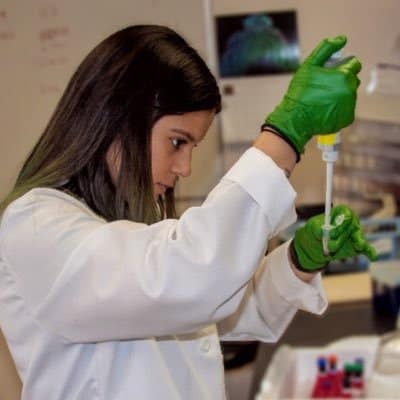In recent years, there has been a renewed and welcomed focus on female scientists in STEM (science, technology, engineering, and math) disciplines. The same is true for female scientists in the cancer immunotherapy space.
CRI is proud to feature a few female immunologists and researchers in this first week of Cancer Immunotherapy Month. The scientists highlighted in this post are already making a promising impact early in their careers. These individuals are innovative, have bright futures ahead of them, and are helping us realize the dream of a future immune to cancer.

Dr. Bruno is an assistant professor in the University of Pittsburgh’s department of immunology. She is also a faculty member in the Tumor Microenvironment Center and the Cancer Immunology and Immunotherapy Program at the University of Pittsburgh Medical Center (UPMC) Hillman Cancer Center. Additionally, Dr. Bruno is focusing on ovarian cancer through her grant as a CRI-V Foundation CLIP Investigator.
The work Dr. Bruno is focused on fills a major need because less than 10 percent of ovarian cancer patients benefit from current immunotherapy treatments. Dr. Bruno seeks to understand how mesenchymal stem cells (MSCs), which can either promote or suppress the immune system’s response to cancer, interact with cancer-fighting T cells. This will help her understand specific factors within the ovarian cancer tumor microenvironment so that innovative treatments can be tailored to improve patient outcomes.

Dr. Gibson is a postdoctoral fellow at the Oregon Health & Science University’s Rauch Lab, which focuses on researching infection and inflammation of the skin and internal organs. She is a CRI-Bristol Myers Squibb Postdoctoral Fellow and is also supported by a 2023 CRI Irvington Postdoctoral Fellowship to Promote Racial Diversity. The cancers Dr. Gibson’s research focuses on are colorectal and stomach cancers.
Dr. Gibson seeks to discover the signaling pathway of cell extrusion, a process frequently observed in colorectal cancer where dying cells are removed while the epithelial barrier is kept intact. These results will inform the screening for top candidates in human irritable bowel syndrome (IBD) patient tissue samples. This study aims to inform the scientific community’s understanding of the catalysts of IBD and how the disease progresses to colorectal cancer.
Valsamo (Elsa) Anagnostou, MD, PhD

Dr. Anagnostou is the director of thoracic oncology biorepository and assistant professor of oncology at Johns Hopkins University’s Sidney Kimmel Cancer Center. Her molecular oncology laboratory strives to uncover the genomic wiring of immune response to immunotherapy, and her research focuses on lung cancer. She is also a CRI Clinical Accelerator Investigator and the study chair of an ongoing CRI-funded clinical trial.
Dr. Anagnostou and her team seek to determine if circulating tumor DNA (ctDNA), a biomarker in the blood that can be non-invasively obtained, can help doctors detect patients’ treatment responses quicker than traditional radiographic imaging. This could help oncologists identify patient responses to treatment with more accuracy and in a timely manner, allowing changes in treatment course that can prolong patients’ lives. Additionally, Dr. Anagnostou hopes the knowledge she derives from her research helps oncologists select patients for clinical trials.

Dr. Molina is a senior fellow at the University of Washington’s Oberst Lab, which focuses on studying programmed cell death (also known as cellular suicide), which is a crucial step in tumor suppression and immunity. She is also supported by a 2023 CRI Irvington Postdoctoral Fellowship to Promote Racial Diversity.
CRI’s support is enabling Dr. Molina to combine engineered cell death proteins with adoptive T cell therapy to help inform the production of innovative immunotherapy treatments for solid tumors. She believes her strategy will overcome obstacles in cancer immunotherapy by activating anti-tumor immune response. This will improve both the potency and resiliency of CAR T cell and immune checkpoint treatments while reducing side effects.
Though there are encouraging developments that serve to make the cancer immunotherapy space more inclusive, we should still strive for further progress. Drs. Bruno, Gibson, Anagnostou, and Molina are beacons of hope and innovation in the cancer immunotherapy research space. Thanks to their contributions and the boundary-pushing work of countless others, female immunologists play a pivotal role in the fight to end cancer.

